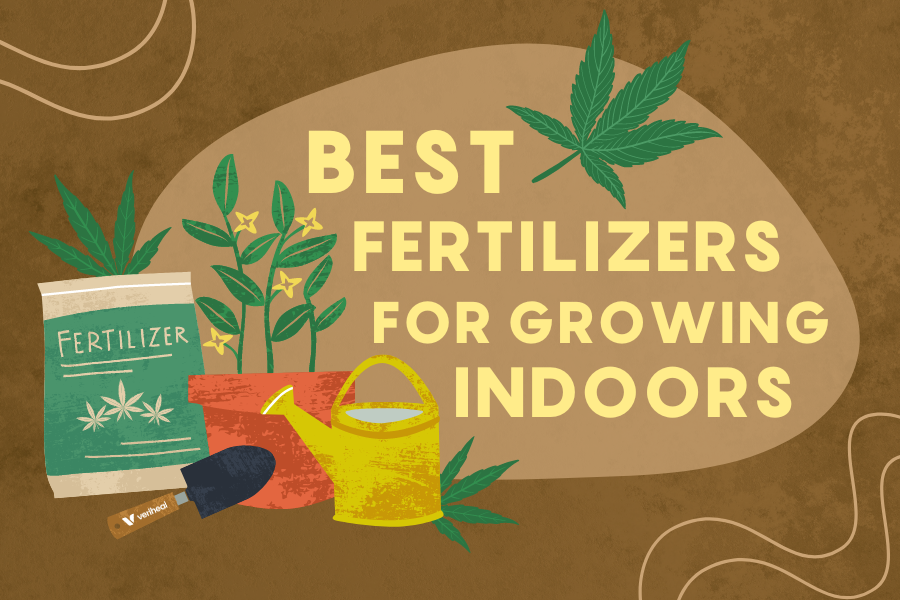Many people believe indoor cannabis is better than outdoor cannabis, but that isn’t always true. It really boils down to the grower and the genetics they’re using. Providing cannabis with the right environment is vital to the crop’s success. No matter where you grow, cannabis will need some of the same things to thrive. In both growing environments, fertilizers are often utilized to increase potency, flavor, and yield.
When it comes to fertilizer for cannabis, a common term you’ll hear is NPK. This stands for nitrogen (N), phosphorus (P), and potassium (K). These are the three main constituents found in cannabis fertilizers. However, cannabis needs more than fertilizer to grow right. In fact, if not utilized correctly, some fertilizers can harm cannabis plants by burning leaves and creating a buildup in buds. This can cause a foul taste and unpleasant side effects like headaches, nausea, or dizziness.
Cannabis is legal in many places, with even more set to legalize it in the not-too-distant future. This means more people have legal access to cannabis. Not everyone wants to buy their herb from a dispensary. Some people prefer to grow their own. Cannabis may grow like a weed, but it can also shrivel up and die quickly. It’s easy to grow, yet difficult and temperamental all the same. If you plan to grow cannabis, it is essential that you understand the pros and cons of cannabis fertilizers.
In addition to the right growing medium, light exposure and intensity, humidity, genetics, the NPK found in fertilizers, other micronutrients, and many other factors play an important role in how good or bad cannabis plants grow. When it comes to fertilizers for cannabis, it is advised to stay as natural as possible. While for some, this may mean opting for adding things such as coffee grounds, eggshells, and other natural materials to their soil or making a homemade fertilizer; there are also commercially available fertilizer options that are just as natural. However, not all commercial fertilizers are recommended for cannabis cultivation.
The Basics of Cannabis Fertilizers
When discussing cannabis fertilizer options, there are both organic and inorganic options. Organic fertilizers are derived from living matter, whereas inorganic fertilizers utilize mined or synthetic minerals. Fertilizers come in a wide array of different combinations. However, there are three basic ways that you can provide your cannabis plants with fertilization:
- Powdered Fertilizers that are mixed in with or added on top of the soil
- Liquid fertilizers that are mixed with the water you give your plants
- Liquid fertilizers that are diluted in water and sprayed on your plants
The Best Fertilizers for Growing Cannabis Indoors
The best fertilizer to use when growing cannabis indoors is a natural one that you can use the least amount of and get the best results from. In most instances, you only need to use a fraction of the suggested amount of product to get good results. Some of the most highly embraced natural fertilizers that are commercially available for cannabis are listed below.
Fertilizers for Vegetative Cycle
Fertilizers for Flowering Cycle
How to Make Cannabis Fertilizer at Home for Indoor Cultivation
Buying premade fertilizers is a great way to start growing quality cannabis, but they’re not the only option. You can make fertilizer for indoor cannabis plants at home and have the confidence of knowing exactly what’s going into your grow.
The first step to creating truly homemade cannabis fertilizer at home is to start composting. For the best nutrient content, try adding things such as coffee grounds, banana peels, citrus peels, tea bags, vegetable peels, egg shells, bat guano, worm castings, rock dust, fish meal, wood ash, bone and fish meals, kelp, herbs such as nettles, cooking water used to boil veggies, manure, and grass clippings.
Once you have a healthy compost, you can make your own compost tea which is then utilized to fertilize your plants either through spraying it on the foliage or by adding it to the water you feed your plants.
What You Will Need
- 5-Gallon Bucket
- Large Mesh Bag
- Non-Chlorinated Water
- Organic Compost
Steps to Make Compost Tea, an Organic Fertilizer for Cannabis
- Fill the bucket ¾ of the way full using non-chlorinated water.
- Fill the mesh bag with compost.
- Place the mesh bag in water.
- Place the bucket in a dark, cool environment.
- Stir the mixture daily for 1-2 weeks.
- Strain the compost and utilize the compost-infused water (compost tea) to water your plants!
Fertilizers for Indoor Cannabis Plants
As mentioned, the base of fertilizer for cannabis is nitrogen (N), phosphorus (P), and potassium (K). Other micronutrients like copper, zinc, iron, nickel, and others are often added to this base to help amend depleted elements in the soil that occur because of the growth of plants. It is essential to understand that plants produce their own plant food naturally. However, the use of fertilizers in the growing medium is vital to replenish and substitute for lost nutrients. It is important, however, to avoid overfertilizing your plants as this can lead to issues such as salt buildup in the soil, greater susceptibility to illness and pests, soil microorganism damage, and plant diseases such as iron chlorosis and root rot. You can help prevent overfertilization by not fertilizing during droughts or when plants are wet. Using slow-release fertilizers and compost that fertilizes slowly is also advised.
Whether you are purchasing commercial fertilizers or making your own, it is important to understand what ingredients are rich in which minerals so as to best provide your plants with exactly what they need as they show signs of nutrient deficiency throughout the various growth cycles. If you are looking to grow your own cannabis as either a medical cannabis patient or as a legal retail consumer, learning fertilizers is just one of many aspects of cultivating cannabis that you will need to familiarize yourself with.
Author, Share & Comments















